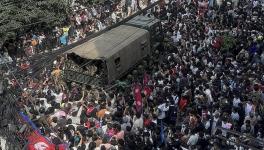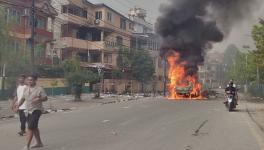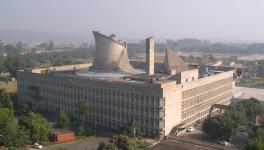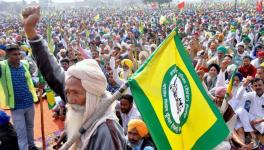Punjab: Women Farmers, Students are Claiming Political Space for Themselves
Punjab has been in the news for quite some time – from the long-drawn farmers’ struggle to the dramatic change in leadership of the ruling Congress government, to the heating up of politics in the run-up to the Assembly elections due early next year.
But what’s really making headlines for almost one year now is the peaceful sit-in by Punjab’s farmers on Delhi’s borders, protesting against the three Central farm laws and demanding a legal guarantee for minimum support price for crops. (Their struggle has paid off in that Prime Minister Narendra Modi announced repeal of the farm laws on Friday – on the occasion of Guru Purab)
However, today, the protests by Punjab’s farmers are a household topic of discussion in the state. Their movement along with state repression of it, has laid bare the cracks in the functioning of our democracy. The patience and perseverance of the protesters have been constantly put to test, be it barricading their entry into the national capital Delhi, teargassing, lathi-charge, digging up roads, putting nails on the roads to stop tractors from moving ahead, among others.
In Punjab, the farmers’ struggle showcased the coming together of communities offering active and passive support. And in this long struggle, women continue to be equally passionate participants. Be it joining the protests in solidarity, giving fiery speeches, setting up community kitchens at protest sites, creating awareness in villages and mobilising other women, holding rallies, or mourning those who died by suicide on account of agrarian distress. But, sadly, women are still not recognised for their work as farmers in the country.
About 42% of women workers in Punjab are engaged in farming or related work, according to a National Sample Survey report of 2011. They are cultivators, tillers, managers of livestock, processors of agriculture produce and agricultural labourers but not always recognised as farmers.
“We toil in the fields alongside the men, do equal if not more work. Who are we—if not farmers?” Harmair Kaur, 70, a farmer sitting in her home in a remote village, Kheewa, in Mansa district told NewsClick. She was at the protest site on Tikri border Delhi and survived an accident that killed three of her friends. “This is not just a men’s protest,” she adds.
Harmeet Kaur, 56, is of the view that the farmer protests have brought people together. Caste, class, Dalits, landless labour unions, women, students from farming backgrounds and others have come together because land and livelihoods are at stake. As Harmair Kaur say: “It is not his fight or their fight, it is our fight”.
The death of three friends and a seriously injured fourth friend has not dampened her spirits toward participation in the protest. “Sadda josh hor wad gaya hai (our spirits are higher than before),” she adds.
The country witnessed the strength of Punjab’s women in the numbers that joined the protest, On March 8 - International Women Day -- all roads leading to the borders had turned yellow. It is estimated that there were more than one lakh women at the three borders of Delhi - Singhu, Tikri and Ghazipur.
Women wearing yellow dupattas singing ‘Merian rang de basanti chunniyan maiye’, an adaptation of a popular song Mera rang de basaanti chola (associated with revolutionary freedom fighter Bhagat Singh who was hanged by the British colonialists), were seen marching toward Delhi in solidarity with farmers and also collectively stake a claim as equal as farmers in their own right and not just mere members of farmer households.
While travelling through the interiors of Mansa district, one could see banners with the faces of the three women who had lost their lives at Tikri border in an unfortunate accident on October 28. The banner titled ‘Shradhanjali Samaroh’ (Homage Meeting) questioned how many more sacrifices were needed to get rid of the farm laws, with slogans like ‘shaheedn taude kaaja dhura elaake je karange pure’ (we will finish the work which martyrs have left unfinished).
The martyred women have earned respect not only from other women but the whole community. Villagers have come forward to support the affected families. Women showing support and solidarity with the protesters with pride and standing as equals with men is one of the palpable changes visible in the villages.
A woman activist Harinder Bindu, a leader of the women’s wing of the BKU-I (Ugrahan group) in Bhucho Khurd village in Bathinda, says the success of the farmers' struggle is the change of relationship between men and women. “Women observed that men have started to share housework to enable the women to take their place at the protest sites. They believed that it is now becoming a relationship of mutual respect and interdependency. Female farmers are being seen, heard and acknowledged,” she adds.
Urban Landscape Changes
Away from villages, in urban areas, women now outnumber men in universities. Against the national average of 48.4% of girls in tertiary education, Punjab has 51.1% of girls enrolled in higher education. Is this another step toward gender equality or do the numbers have a different story to tell?
In one of the universities where girls have outnumbered boys, young girls opined that the university education/degree would serve as their ‘passport’ to clear IELTS (International English Language Testing System) exam and go to Canada and help their brothers and parents lead a better life, either in Canada or in their own hometowns.
The Western country is a favourite destination for people from Punjab. Posters, hoardings and wall writings on how to get visas and go to Canada can be seen across villages.
Educated or not, one of the girl students feels “I am not alone in feeling burdened by the expectations and pressures of clearing IELTS. Most of us do not have any say in our future. Asserting will mean facing violence at home and even fearing honour killing”. She is proud of their collective achievement of 24/7 hostel timings.
Pam Rajput from the Centre for Women Studies, Panjab University in Chandigarh, told NewsClick that women’s participation in the university elections had increased, but there is still a long distance to be covered for gender equality. According to her, women students have become the star/main campaigners for nominated candidates. Yet, there has only been one woman president since student elections started taking place in the university. Rajput says a woman still needs to fight for a position for herself. “She is still a second class citizen, who needs to ask for permission to go anywhere except when she is going to the gurudwaras, temples in this masculine and patriarchal society of Punjab.”
One asks then, has the situation of women improved? Will this change be transformative? Will it last? Can the women in the state begin to dream of a life without backlash for expecting their rightful place, life without fear of violence at home and in public spaces, harassment, and become economically and socially equal? Or is this just a temporary relief, not a new beginning?
Get the latest reports & analysis with people's perspective on Protests, movements & deep analytical videos, discussions of the current affairs in your Telegram app. Subscribe to NewsClick's Telegram channel & get Real-Time updates on stories, as they get published on our website.
























